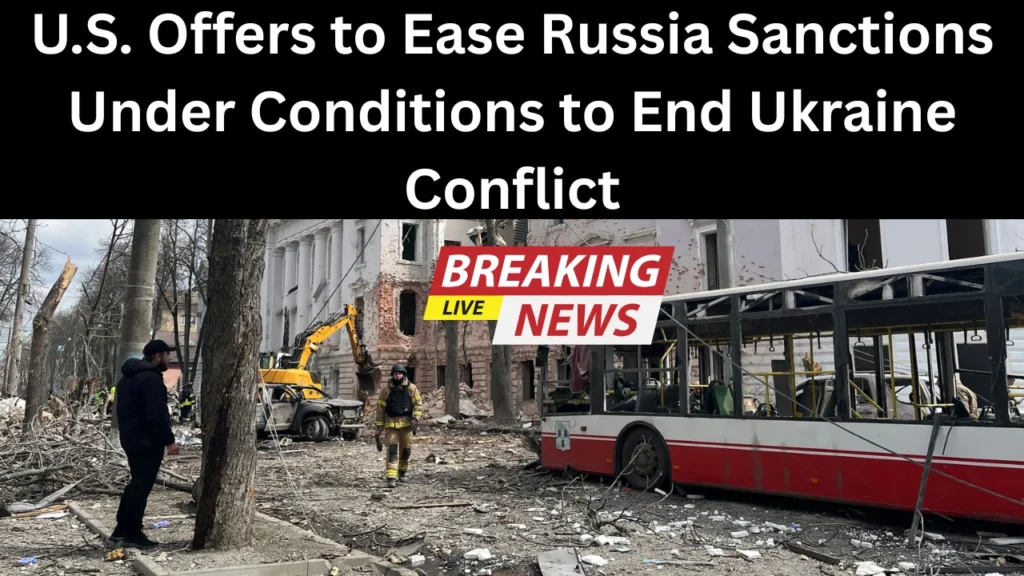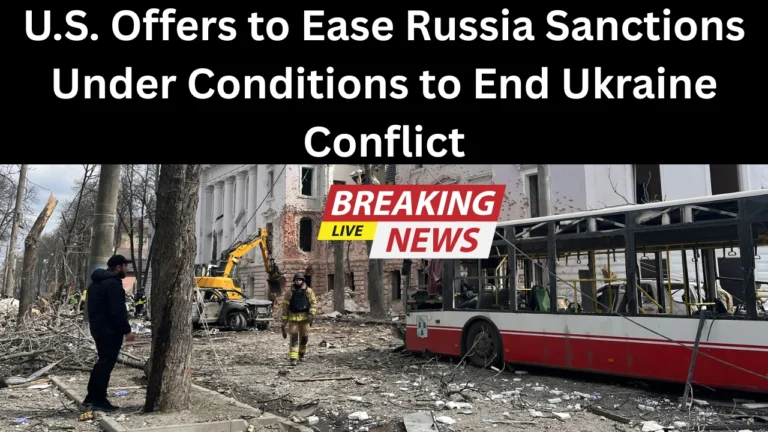In a significant diplomatic maneuver aimed at de-escalating one of the most brutal conflicts in modern history, the United States has reportedly offered to ease economic sanctions on Russia as part of a proposed framework to end the war in Ukraine. The plan, according to a report by Bloomberg, was shared during high-level meetings with European allies in Paris and outlines specific conditions under which a peace deal could be forged.

The U.S. initiative marks a renewed push to bring the over three-year-long war to a halt a war that has devastated Ukraine’s infrastructure, displaced millions, and reshaped global geopolitics. But the proposal is already sparking debate among NATO members, Kyiv’s leadership, and human rights advocates due to its controversial terms.
🚨 *US OFFERS TO EASE SANCTIONS ON RUSSIA IN UKRAINE PEACE PLAN
— Spencer Hakimian (@SpencerHakimian) April 18, 2025
The Russians being treated nicer than the Canadians, Europeans, and the Japanese.
Welcome to the circus.
Sanctions Relief Tied to Ceasefire and Frozen Frontlines
The core of the U.S. proposal is straightforward: if Russia agrees to a lasting ceasefire and halts its military operations, Washington would begin lifting some of the sanctions that have crippled the Russian economy since the 2022 invasion. The proposed deal, however, does not call for a full Russian withdrawal from occupied Ukrainian territories. Instead, it suggests maintaining the current status quo — a move that effectively legitimizes Moscow’s control over certain regions of eastern and southern Ukraine.
Additionally, under the proposed framework, Ukraine would be barred from joining NATO, a long-standing demand of Russian President Vladimir Putin and a key issue that has fueled the conflict.
Sources close to the negotiations said the U.S. offered this framework in meetings held on Thursday in Paris, where U.S. envoy Steve Witkoff met with French President Emmanuel Macron. U.S. Secretary of State Marco Rubio also engaged in closed-door talks with top diplomats and national security advisors from France, Germany, the United Kingdom, and Ukraine.
Rubio’s Ultimatum: ‘We Won’t Wait Forever’
On Friday, Secretary Rubio delivered a stark warning to the involved parties. Speaking to reporters in Paris, he said the Trump administration is ready to “move on” from peace negotiations if no meaningful progress is made in the coming days.
“We’re not going to drag this out for weeks or months,” Rubio stated. “We need to decide quickly, within days, whether a deal is achievable in the coming weeks. If it is, we’re committed. If not, we’ll shift our focus to other priorities.”
Rubio’s remarks underscore the urgency behind the renewed diplomatic efforts, as well as the Trump administration’s eagerness to chalk up a foreign policy victory ahead of the U.S. midterm elections.
VP Vance Offers a More Optimistic Outlook
Offering a more hopeful tone, U.S. Vice President JD Vance spoke in Rome on Friday, where he expressed confidence that the end of the war may finally be within reach.
“I’m optimistic,” Vance told journalists. “We’re having serious conversations. If all sides are willing to engage sincerely, I believe we can find common ground that secures peace while protecting Ukraine’s sovereignty and the broader European security order.”
Vance’s comments reflect internal differences within the administration, with Rubio pushing for swift resolution or disengagement, while others advocate for continued diplomacy.
A Fragile Proposal That Risks Backlash
While the offer of sanctions relief might seem like a diplomatic breakthrough, it raises profound concerns. For Ukraine, the prospect of a “frozen conflict” — where occupied territories remain under Russian control is a bitter pill. Ukrainian officials, while not rejecting the deal outright, have warned that such a plan could embolden future aggression and undermine the country’s sovereignty.
Several EU leaders have also expressed skepticism. German and Baltic state representatives have previously stated that any proposal that rewards territorial conquest sets a dangerous precedent.
Human rights groups, meanwhile, fear that a deal without justice or accountability measures — including war crimes investigations — could leave victims of the war without closure.
Macron, Europe Walk a Diplomatic Tightrope
French President Emmanuel Macron, who hosted the Paris discussions, is said to be playing a key role in mediating between the U.S. and more hesitant European allies. While France has signaled it is open to creative solutions for ending the war, officials close to Macron insist that any agreement must be built on Ukraine’s terms and avoid undermining the principles of international law.
Reports suggest that Macron has pushed for more clarity from Washington regarding what specific sanctions would be lifted — and under what timeline — should a ceasefire be implemented.
Ongoing Strikes Highlight Urgency
Even as talks were underway, the reality on the ground in Ukraine remained grim. Russian missile strikes overnight killed two people and injured at least 27 in Kharkiv and Sumy, according to Ukrainian authorities. Images of destroyed residential buildings flooded international media, reinforcing the need for an immediate end to hostilities.
With civilians continuing to bear the brunt of the war, public pressure is mounting globally for a resolution. However, any perceived compromise — particularly one that allows Russia to retain control over annexed regions is likely to trigger fierce debate both inside Ukraine and across the Western alliance.
What’s Next?
The coming days will be critical. According to sources familiar with the matter, a follow-up round of meetings between U.S. and European diplomats is expected next week, potentially with Ukrainian President Volodymyr Zelenskyy or his representatives present. The White House, for now, is staying tight-lipped on further details but insists that the ball is now in Moscow’s and Kyiv’s court.
If the U.S. plan gains traction, it could mark a turning point in the war. If not, it may signal the start of a new phase — one where major powers begin to reframe their engagement and priorities around a prolonged and entrenched conflict.

